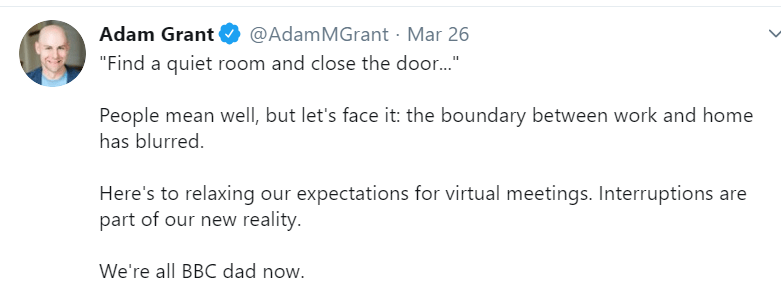Leaders who recognize our new reality as an opportunity will be able to accelerate their organizations through crisis to recovery faster than those who don’t.
“’Find a quiet room and close the door…’ People mean well, but let’s face it: the boundary between work and home has blurred. Here’s to relaxing our expectations for virtual meetings. Interruptions are part of our new reality. We’re all BBC dad now.”

When Adam Grant tweeted this, 21 states had stay-at-home directives in place, many schools had announced temporary closures, and President Donald Trump was steadfast that the country would reopen by Easter.
Fast forward eight weeks. More than 62 percent of employed Americans are working from home, and all but eight states have closed schools for the remainder of the year. At the same time, more than half of the 42 states that enacted stay-at-home directives have begun to ease these directives and open their economies in a meaningful way or have announced plans to do so soon.
Even as the country begins to reopen, corporate America is not rushing to bring employees back to into the office. Capital One has told employees they will be working remotely through Labor Day and possibly longer. Amazon is saying October. Google and Facebook have announced that employees could be working from home until next year. Nationwide has gone so far as to shutter five offices and announce that its 4,000 will work from home permanently.
Let’s face it, the boundary between work and home has blurred, and for those with children, we are all BBC dad now – and for the foreseeable future.
Leaders that recognize this new reality as an opportunity and fundamentally redesign their organizations and ways of working will recover faster and stronger than those who don’t.
This means rethinking the ideal worker, accelerating digital transformation, shifting the focus of work from time to output, flexible work policies, and reimaging the workday.
It also means increasing communication and transparency and trusting one another.
To be successful, leaders will need to model the desired behaviors and will need to align the organization around their future vision.
Further, more than ever, empathy will be the hallmark of effective leaders and successful organizations. Leaders who lead with empathy and who build a culture of empathy will be more likely to accelerate their organizations through to recovery than those who don’t.







